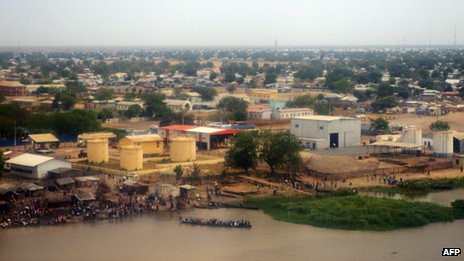
Malakal in South Sudan on east bank of the Nile River. Reports indicate that 200 people drowned trying to escape fighting., a photo by Pan-African News Wire File Photos on Flickr.
14 January 2014
Last updated at 12:19 ET
BBC World Service
South Sudan Nile ferry sinks with more than
200 dead
More than 200 civilians in South Sudan have drowned in a Nile ferry accident while fleeing fighting in the town of Malakal, an army spokesman has said.
He said women and children were among the victims in Sunday's disaster.
More than 350,000 people have been displaced by the fighting between the South Sudanese government and rebel forces, according to the UN.
Rebels say they have captured Malakal, which is the gateway to the oilfields of the Upper Nile region.
However, this was denied by an army spokesman, who said the rebels had been pushed back after heavy fighting in the city.
"The reports we have are of between 200 to 300 people, including women and children. The boat was overloaded," army spokesman Philip Aguer told the AFP news agency.
"They all drowned. They were fleeing the fighting that broke out again in Malakal," he added.
Malakal is located on the banks of the White Nile - just north of its confluence with the Sobat River.
Thousands of civilians have been trying to escape the clashes by crossing the river, but many say they simply cannot afford to pay for a boat, says the BBC's Andrew Harding in South Sudan.
One refugee, Akuch, told our correspondent that she had had to borrow as much as 150 Sudanese pounds (£40; $66) to cross the river.
Some 9,000 civilians have recently arrived at a UN base in Malakal, almost doubling the number of people seeking shelter there, our correspondent says.
Malakal has already changed hands several times since the conflict began last month.
In the south, government troops are believed to be advancing on Bor - the only major town previously in rebel hands.
Meanwhile, talks aimed at securing a ceasefire in South Sudan are currently taking place in the Ethiopian capital Addis Ababa.
The negotiations are being overseen by the East African regional bloc, Igad.
The violence erupted on 15 December between forces loyal to President Salva Kiir and soldiers backing Riek Machar, his former vice-president.
President Kiir is a member of South Sudan's largest ethnic group, the Dinka, while Mr Machar is from the Nuer community - the country's second largest.
The conflict has seen reports of mass killings along ethnic lines even though both men have prominent supporters among their rival's community.
The UN estimates that more than 1,000 people have died since the conflict began on 15 December.
South Sudan seceded from Sudan in 2011 after a long and bloody conflict, to become the world's newest state.
No comments:
Post a Comment